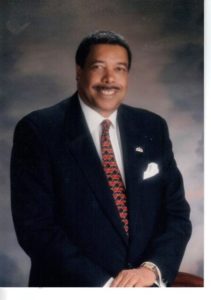After the Coronavirus Will Airport Concessions Survive?
By Wellington E. Webb
 What a great feeling it is to be flying again for work after social distancing because the coronavirus protections have been lifted. This plane is more than half full, even after many of the airlines decreased their flights by more than 50 percent. It’s going to take awhile before the traveling public responds to flying again. The flight attendants have been so nice. The pilots greeted us as we boarded the plane. I guess they’re also happy to be working again. I can’t wait until my plane lands in Atlanta to grab a double burger, fries and beer in the airport terminal before my next flight. We’re coming in for a landing. The pilot has asked us to keep our seats until the flight attendants give us a to-go sandwich and a cookie.
What a great feeling it is to be flying again for work after social distancing because the coronavirus protections have been lifted. This plane is more than half full, even after many of the airlines decreased their flights by more than 50 percent. It’s going to take awhile before the traveling public responds to flying again. The flight attendants have been so nice. The pilots greeted us as we boarded the plane. I guess they’re also happy to be working again. I can’t wait until my plane lands in Atlanta to grab a double burger, fries and beer in the airport terminal before my next flight. We’re coming in for a landing. The pilot has asked us to keep our seats until the flight attendants give us a to-go sandwich and a cookie.
When I depart the plane I discover the airport terminal is empty. Where is everyone? Even the shoeshine station sits empty, and the restaurants and book stores are closed with the lights off. I stop and ask a security guard where is everyone. He glumly replies: “They’re gone, they went bankrupt.” I spot one news stand open. The cashier steps forward and laments the concessions were a $10 billion industry that employed 125,000 people and raised $2.5 billion in revenue for airports. But that was before the coronavirus. I asked the cashier why he is so informed and he reveals he is the owner. He had many employees but without federal aide he had to fire his workers. He and his wife were the only ones working now. I asked him why he didn’t lay them off and he said, “I’m responsible to pay their health benefits and I can’t afford it but if I terminate them they can draw unemployment benefits.”
He also explained how the White House and Congress approved a bailout bill that didn’t include the airport concessions.
The aviation industry is like that of a three legged stool. The financial aide covered only two legs of that airline stool: the first leg the airlines the flight attendants, pilots, mechanics and other staff; the second leg the airports, terminals and facilities and their staff.
Shortsightedly, they skipped the third leg of the stool, which are the McDonald’s, Burger King, Starbucks, news stands, shoeshine stands, popcorn stand, lounges and bars. They are the very retail services that make up the hustle and bustle of an airport terminal. Just like a stool with only two legs won’t stand, an airport with no concessions won’t stand either.
Hungry travelers, thirsty travelers and bored travelers who yearn for something to read turn into angry passengers on planes.
All that Congress had to do was include a clause in the aviation stimulus bill, which would have provided 2 percent of the bailout to financially helped airport concessions. But unfortunately there was no champion in Congress to speak for this group.
Without help from the White House and Congress, the above gloomy scenario will face airport concessions that won’t survive or be able to rebuild. The FAA protects airports but so far there is no champion for these women and minority owned businesses, and small businesses nationwide. A once mighty industry that could be killed by neglect, will go the way of Tyrannosaurus rex. That does not have to happen if Congress and the White House act to help this industry.
As of April 6, airports nationwide have seen traffic down by 80 percent.
Think of your home airport and all the hard working people employed by every concession you see. Don’t let their livelihoods become extinct. Give them a real chance to continue to be an important aspect of every airport nationwide.
Wellington E. Webb served three terms as the 42nd Mayor of Denver, Colorado. He built 85 percent of Denver International Airport, created a minority and women’s airport concession program, which became a national model.

